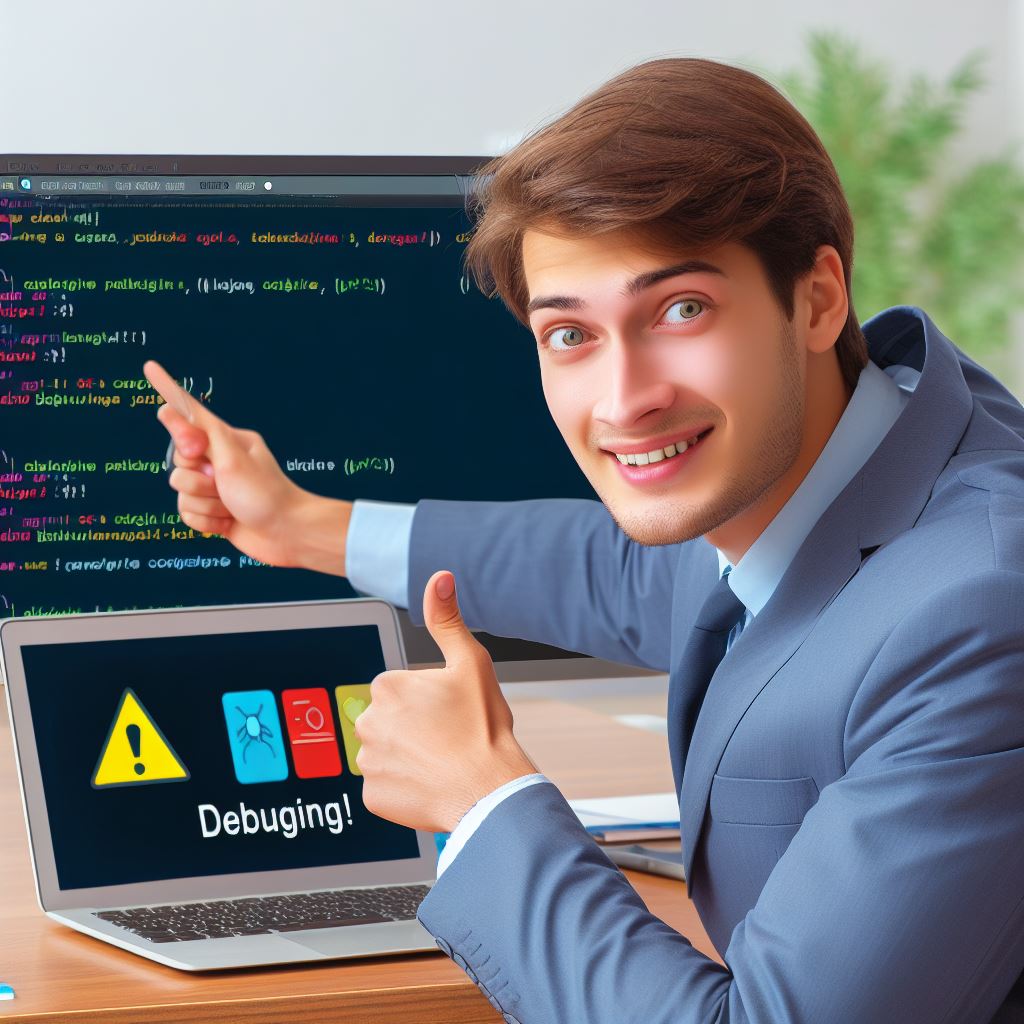Introduction
Debugging is an essential skill for coding newbies to master. When writing code, errors are inevitable and can be frustrating.
However, the ability to identify and fix these errors is crucial for becoming a proficient programmer.
Without effective debugging techniques, your code may not run as intended, leading to program crashes or incorrect outputs.
A. Importance of debugging in coding
The importance of debugging lies in its ability to save time and effort.
By quickly identifying and resolving errors, you can avoid spending hours trying to figure out what went wrong.
Additionally, debugging helps improve the overall quality of your code by ensuring that it functions correctly and efficiently.
B. Target audience: coding newbies
The target audience for this guide on debugging tips is coding newbies.
These individuals are just starting their coding journey and may not have much experience with troubleshooting errors.
By providing them with practical and easy-to-follow techniques, they can gain confidence in their ability to debug their code effectively.
Throughout this section, we will explore various debugging strategies and tools that are helpful for coding newbies.
From understanding common types of coding errors to utilizing debugging tools like breakpoints and print statements, this guide will equip you with the skills you need to tackle errors head-on.
So, whether you are a beginner coder or someone looking to enhance your debugging skills, this section will serve as a comprehensive resource for mastering the art of debugging.
Let’s dive in and discover how to overcome those frustrating coding errors!
Understanding Debugging
Debugging is an essential process in coding that involves identifying and fixing errors or bugs in a program.
A. Definition of debugging in coding
- Debugging refers to the process of finding and resolving errors in a computer program.
- It is a systematic approach to identify, understand, and fix issues that impede the proper functioning of a program.
- Debugging is crucial for ensuring the reliability and correctness of software applications.
B. Purpose of debugging
- The main purpose of debugging is to eliminate errors or bugs from a program.
- Debugging helps improve the overall quality and performance of the software.
- It ensures that the program behaves as intended and produces the expected output.
- Debugging also helps in understanding the logic and flow of the code, enabling better code comprehension.
- Additionally, it reduces development time by identifying issues early in the coding process.
C. Common reasons for bugs
- Errors in syntax: Incorrect usage of programming language syntax can lead to bugs.
- Logical errors: Flaws in the program’s logic can result in unexpected behavior.
- Incorrect data handling: Mishandling data input or output can cause bugs.
- Inadequate testing: Insufficient testing might fail to uncover potential issues.
- Integration problems: Errors can arise when different components or modules interact.
- External factors: External dependencies or system configurations can introduce bugs.
Debugging can be a challenging and time-consuming process, but with the right approach, it becomes more manageable.
By using various debugging techniques and tools, developers can efficiently locate and resolve bugs.
A systematic approach involving breakpoints, console output, and code review can greatly aid in debugging.
Understanding the specific context and flow of the problematic code segment is crucial for effective debugging.
It is important to focus on one bug at a time instead of trying to fix multiple issues simultaneously.
Using version control systems can be beneficial to track and revert changes while debugging.
Collaboration with colleagues or online communities can provide fresh insights and alternative perspectives.
Furthermore, documenting the debugging process can aid in future reference and knowledge sharing.
Tech Consulting Tailored to Your Coding Journey
Get expert guidance in coding with a personalized consultation. Receive unique, actionable insights delivered in 1-3 business days.
Get StartedFinally, perseverance and patience are key traits for successful debugging, as complex issues may require extensive analysis.
Understanding the definition, purpose, and common reasons for bugs can make the debugging process more effective.
By utilizing appropriate techniques and approaches, developers can overcome obstacles and create robust software.
Types of Bugs
When it comes to coding, bugs are inevitable. They can frustrate even the most experienced developers.
Understanding the different types of bugs and how to deal with them is a crucial skill for coding newbies.
In this section, we will explore three common types of bugs: syntax errors, logical errors, and runtime errors.
A. Syntax Errors
Syntax errors occur when the code violates the rules of the programming language. These bugs are usually easy to spot as they prevent the code from running altogether.
Imagine forgetting to include a closing bracket or misspelling a keyword – these mistakes can cause syntax errors.
The compiler or interpreter will alert you to these errors with error messages pointing to the exact line and character causing the issue.
To fix syntax errors, carefully review the code and look for any typos, missing characters, or incorrectly placed symbols.
Pay close attention to brackets, semicolons, and quotation marks. Debugging tools and IDEs are handy for highlighting syntax errors, allowing you to correct them swiftly.
B. Logical Errors
Logical errors are trickier than syntax errors as they don’t prevent the code from running, but they produce unexpected or incorrect results.
These bugs occur when the logic used to solve a problem is flawed. For example, you may have an algorithm that fails to consider certain edge cases or incorrectly performs calculations.
The code itself may be syntactically correct, but it does not accomplish what you intended.
To identify and fix logical errors, you need to carefully analyze your code and test it with different inputs.
Use print statements or debugging tools to track the flow of your code and find where it deviates from the expected behavior.
Logical errors require a solid understanding of the problem you are trying to solve, allowing you to think critically and reason about the code’s logic.
C. Runtime Errors
Runtime errors occur during the execution of a program and can cause it to terminate abruptly.
These bugs are often caused by invalid inputs, memory issues, or unforeseen circumstances.
Examples of runtime errors include division by zero, accessing out-of-bounds memory, or attempting to use a null object.
To handle runtime errors effectively, you can utilize exception handling mechanisms provided by programming languages.
By catching and handling exceptions, you can gracefully recover from errors and prevent your program from crashing.
Proper input validation, checking for null values, and monitoring memory usage can also help mitigate runtime errors.
Bugs are an inherent part of coding, and learning how to debug effectively is essential for any newbie programmer.
By understanding the three main types of bugs – syntax errors, logical errors, and runtime errors – you are equipped to tackle and resolve common coding issues.
Remember, debugging is not only about fixing the code but also about improving your problem-solving skills and becoming a better developer.
Practice, patience, and attention to detail will help you overcome bugs and write clean, efficient code.
Preparing for Debugging
In order to effectively debug your code, it is important to prepare yourself and create a conducive working environment.
Here are some tips to help you get ready for the debugging process:
Build Your Vision, Perfectly Tailored
Get a custom-built website or application that matches your vision and needs. Stand out from the crowd with a solution designed just for you—professional, scalable, and seamless.
Get StartedA. Creating a conducive working environment
- Find a quiet and comfortable place to work where you can focus without distractions.
- Ensure that you have a reliable internet connection and a working computer with the necessary software and tools for coding.
- Set up a dual monitor system if possible, as it can greatly enhance your productivity by allowing you to view code and debug tools simultaneously.
- Keep your workspace organized and clutter-free, ensuring that you have easy access to any reference materials or resources that you may need.
- Adjust the lighting and temperature of your workspace to make it comfortable for long coding sessions.
B. Using proper coding practices
- Follow a consistent naming convention for variables, functions, and files to make your code more readable and understandable.
- Break your code into smaller, manageable chunks by using functions or methods. This will make it easier to locate and fix errors.
- Use comments to explain the purpose and functionality of your code. This will help you understand it later and make it easier for others to collaborate with you.
- Avoid using global variables whenever possible, as they can make your code more prone to bugs. Instead, use local variables and pass values between functions as parameters.
- Test your code frequently as you write it, rather than waiting until the end. This will help you catch and fix errors early on, saving time and effort.
C. Properly documenting code
- Write clear and concise comments that accurately describe what each section of code does. This will make it easier for you and others to understand and debug the code later.
- Include relevant documentation within your code, such as function signatures, input-output formats, and any assumptions or limitations.
- Use meaningful variable and function names that convey their purpose and reduce the need for extensive commenting.
- Keep a separate document or wiki with an overview of your project structure, dependencies, and any other important information.
By following these tips, you will be better prepared for the debugging process and more likely to locate and fix errors efficiently.
Remember that debugging is an essential part of coding, and with practice, you will become more proficient in identifying and resolving issues in your code.
Read: Financial Aid Options for Coding Courses in the USA
Essential Debugging Techniques
Debugging is an essential skill for every coder, regardless of their level of experience.
It can be frustrating and time-consuming, but with the right techniques, you can quickly identify and fix bugs in your code.
In this section, we will discuss five essential debugging techniques that every newbie coder should know.
A. Reading error messages
Error messages can be intimidating, but they provide valuable information about what went wrong in your code.
Take the time to carefully read and understand the error message.
It often includes the line number where the error occurred and a brief description of the issue.
Pay close attention to the specific error type to narrow down the problem.
B. Using print statements
Print statements are one of the simplest yet most effective ways to debug your code.
By strategically placing print statements throughout your program, you can track the flow of execution and observe the values of variables at different stages.
This helps you identify any unexpected behavior and pinpoint the exact location of the bug.
C. Stepping through code with a debugger
A debugger is a powerful tool that allows you to step through your code line by line, executing it and observing the changes in variables.
It lets you pause the program at certain points, examine the call stack, and inspect the values of variables.
This technique is particularly useful for complex programs where print statements may not be sufficient.
D. Analyzing code flow and data values
Understanding the flow of code execution and the values of data at different points is crucial for effective debugging.
By mentally tracing the path that your code takes, you can uncover potential logic errors or unexpected behaviors.
Keep an eye out for any variables that are not behaving as expected or data conflicts that might cause errors.
E. Utilizing online resources and communities
As a newbie coder, you are not alone in your debugging journey.
There are numerous online resources, forums, and communities where you can seek help and learn from experienced coders.
Websites like Stack Overflow and GitHub have vast collections of code snippets and discussions that can provide valuable insights into common bugs and their solutions.
Basically, debugging is an integral part of the coding process, and mastering debugging techniques is essential for every newbie coder.
By reading error messages, using print statements, stepping through code with a debugger, analyzing code flow and data values, and leveraging online resources.
Remember, practice makes perfect, so don’t be discouraged by initial difficulties.
Keep coding, keep debugging, and soon you’ll become a skilled bug hunter!
Read: Financial Aid Options for Coding Courses in the USA

Efficient Debugging Strategies
Debugging is an essential skill for any programmer, especially for coding newbies who are just starting their coding journey.
It can be frustrating when your code doesn’t work as expected, but with the right strategies, you can overcome these challenges efficiently.
In this section, we will discuss some efficient debugging strategies that can help you in your coding journey.
Optimize Your Profile, Get Noticed
Make your resume and LinkedIn stand out to employers with a profile that highlights your technical skills and project experience. Elevate your career with a polished and professional presence.
Get NoticedA. Isolating the bug
- Identify the specific part of your code where the bug is occurring.
- Make use of debugging tools, such as print statements or breakpoints, to narrow down the problem area.
- Check if any recent changes in your code might have introduced the bug.
B. Reproducing the bug
- Understand the steps or conditions under which the bug occurs.
- Try to replicate the bug consistently so that you can analyze its behavior and find a solution.
- Document the steps to reproduce the bug, which will be helpful for future reference.
C. Simplifying the code
- Remove any unnecessary code or complexity that is not directly related to the bug.
- Break down the problem into smaller, manageable parts.
- Create a minimal, reproducible example that focuses solely on the bug.
D. Testing hypothesis and assumptions
- Formulate hypotheses about the cause of the bug based on your understanding of the code.
- Test these hypotheses by modifying the code and observing the effects.
- Avoid making assumptions about the behavior of your code; instead, verify them through testing and analysis.
By following these strategies, you can efficiently debug your code and solve programming challenges.
However, debugging is not always straightforward and may require patience and perseverance.
Here are some additional tips to help you in your debugging journey:
- Use version control: Keep track of your code changes using version control systems like Git. This allows you to go back to a working state if your debugging attempts make things worse.
- Take breaks: If you find yourself getting frustrated or stuck, take a break. Stepping away from the problem for a while can give you a fresh perspective when you come back.
- Consult others: Don’t hesitate to seek help from more experienced programmers or online communities. Sometimes a fresh pair of eyes can spot the bug that you might have missed.
- Document your findings: Keep a record of the bugs you encounter and how you solve them. This documentation can be a valuable resource for future reference and learning.
- Learn from your mistakes: Debugging is a learning process. Take the time to reflect on the bugs you encounter and understand the underlying causes. This will help you avoid similar issues in the future.
Efficient debugging is crucial for coding newbies to overcome programming challenges.
By isolating the bug, reproducing it, simplifying the code, and testing hypotheses, you can efficiently debug your code.
Remember to use version control, take breaks, seek help, document your findings, and learn from your mistakes.
With time and practice, debugging will become a more manageable task, and you’ll become a better programmer. Happy debugging!
Read: Web Development: Free Courses for Aspiring Designers
Debugging Tools and Resources
Debugging is an essential skill for coding newbies to master in order to become successful programmers.
Luckily, there are various tools and resources available that can help in this process.
In this section, we will explore some of these tools and resources that can assist newbies in their debugging journey.
1. Integrated Development Environments (IDEs) with built-in debuggers
IDEs, such as Visual Studio Code, IntelliJ IDEA, and Eclipse, are powerful tools that offer a range of features, including built-in debuggers.
These debuggers allow programmers to execute their code line by line, set breakpoints, inspect variables, and track the flow of their program.
IDEs provide a user-friendly interface for debugging, making it easier for newbies to identify and fix errors in their code.
2. Online debugging platforms
There are several online platforms available that offer debugging features specifically designed for newbies.
These platforms provide a virtual environment where programmers can execute their code and receive real-time feedback on any errors or bugs.
Some popular online debugging platforms include Repl.it, CodePen, and JSFiddle.
These platforms often include features like syntax highlighting and error highlighting, making it easier for newbies to identify and fix issues in their code.
3. Community forums and coding communities
One valuable resource for newbies facing debugging challenges is the online coding community.
Websites like Stack Overflow, Reddit, and GitHub have active communities where programmers can ask questions and get help with their coding problems.
When faced with a difficult bug, posting a question on these platforms can often yield insightful responses from experienced programmers.
Additionally, browsing through existing threads and forums can provide newbies with solutions to common debugging issues.
4. Documentation
Most programming languages and frameworks come with extensive documentation that can be a valuable debugging resource.
These documents often provide detailed explanations of functions, methods, and classes, along with examples of their usage.
When encountering an error or bug, referring to the official documentation can help newbies identify the cause of the issue and find the appropriate solution.
For example, the Python documentation and Mozilla Developer Network (MDN) are widely regarded as excellent resources for programmers.
5. Debugging tools
Apart from IDEs, there are specific debugging tools available that can assist in identifying and fixing bugs.
For example, the Chrome DevTools is a popular tool for debugging web applications.
It allows programmers to inspect HTML elements, modify CSS styles, and debug JavaScript code.
Other tools, such as PyCharm for Python or Xcode for iOS development, offer similar debugging functionalities tailored for specific programming languages and platforms.
6. Logging and error handling
Even with all the available tools and resources, it’s always a good practice to implement proper logging and error handling mechanisms in your code.
Inserting print statements or using logging libraries can help newbies trace the flow of their program and identify potential errors.
Furthermore, incorporating robust error handling techniques, such as try-catch blocks, can prevent crashes and provide meaningful error messages to assist in debugging.
Debugging can be a challenging task for coding newbies, but with the right tools and resources, it becomes more manageable.
Read: Learning C++ for Free: Online Resources and Tips
Best Practices for Debugging
Debugging is an essential skill for coding newbies to master.
It can be a frustrating and time-consuming process, but with the right mindset and strategies, it can become easier and more efficient.
In this section, we will discuss the best practices for debugging, including maintaining a positive mindset, documenting the debugging process, and seeking help when needed.
1. Maintaining a positive mindset
Debugging can be challenging, especially for beginners. It is important to approach it with a positive mindset.
Instead of getting frustrated or discouraged, view it as an opportunity to learn and improve your coding skills.
Remember that every bug you encounter is a chance to grow as a developer.
2. Documenting the debugging process
Keeping track of the steps you take during the debugging process is crucial.
Documenting helps you understand what you have tried so far and what worked or didn’t work.
It also enables you to revisit previous steps if needed.
Take notes, create a checklist, or use a dedicated debugging tool or plugin to document your progress and findings.
3. Seeking help when needed
Debugging is not always a solo journey. Don’t hesitate to ask for help when you are stuck.
Reach out to more experienced developers, join coding communities or forums, or seek assistance from online resources.
Explaining your problem to someone else can often lead to new insights and possible solutions.
4. Break down the problem
When faced with a bug, it is crucial to break down the problem into smaller, manageable parts.
Analyze the error message or unexpected behavior and try to isolate the issue by focusing on specific sections or components of your code.
Debugging becomes easier when you can narrow down the problem to a specific area.
5. Use debuggers and logging
Debugging tools like debuggers and logging can be invaluable in identifying and fixing bugs.
Debuggers allow you to step through your code line by line, observe variable values, and track the flow of execution.
Logging statements help you track the program’s progress and values at different stages, making it easier to pinpoint the cause of a bug.
6. Utilize breakpoints
Breakpoints are markers that pause the execution of your code at specific points.
By strategically placing breakpoints, you can examine the state of your program at that particular moment.
This technique enables you to identify when and why the bug occurs, making it easier to fix.
7. Test incrementally and validate assumptions
When debugging, avoid making multiple changes at once.
Instead, test your code incrementally after each modification to ensure that the error has been fixed and that no new issues arise.
Additionally, challenge your assumptions about the cause of the bug.
Sometimes what you believe to be the problem might not be the actual root cause.
8. Learn from your mistakes
Debugging is a continuous learning process. Take the time to reflect on the bugs you encounter and the solutions you implement.
Analyze what went wrong and how you could have approached the problem differently.
Learning from your mistakes helps you become a more effective and efficient debugger.
Remember, debugging is an essential part of the coding process. It requires patience, persistence, and a systematic approach.
By maintaining a positive mindset, documenting your progress, seeking help when needed, and following best practices, you can overcome bugs more effectively and become a better coder.
Embrace the challenges that debugging presents, and view them as opportunities for growth.
Common Pitfalls to Avoid
A. Relying too heavily on debuggers
Debugging is an essential skill for any programmer, but it can be particularly challenging for coding newbies.
As you start your coding journey, it’s important to be aware of some common pitfalls that can hinder your debugging process.
By knowing what to avoid, you can save time, frustration, and improve your overall coding skills.
One common mistake that newbies often make is relying too heavily on debuggers.
Debuggers are powerful tools that allow you to step through your code, inspect variables, and find the source of an issue.
However, becoming overly dependent on them can hinder your ability to think critically and understand the logic behind your code.
Instead of jumping straight to the debugger, try to analyze your code, understand the problem, and then use the debugger as a supplementary tool.
B. Ignoring error messages
Another pitfall to avoid is ignoring error messages. Error messages often provide valuable insights into what went wrong in your code.
They can pinpoint the line of code where the error occurred and give you clues about the nature of the problem.
Instead of panicking or dismissing error messages, take the time to read and understand them.
They can save you plenty of debugging time by directing your attention to the root cause.
C. Neglecting code testing
Neglecting code testing is also a common mistake that newbies tend to make. Testing your code is vital to catch any bugs or errors that may arise.
It’s not enough to assume that your code is correct based on your initial understanding.
By running various test cases and scenarios, you can ensure that your code works as expected in different conditions.
Remember to test both valid and invalid inputs, edge cases, and any potential error scenarios to achieve robust code.
Other common pitfalls to beware of include not documenting your code, neglecting to use version control, and failing to seek help when needed.
Documentation is crucial as it allows you and others to understand the purpose and functionality of your code.
Version control systems like Git enable you to track changes, revert to previous versions, and collaborate with others effectively.
Finally, don’t be afraid to ask for help from experienced programmers or online communities.
Sometimes, a fresh pair of eyes can quickly identify a bug that you might have missed.
As a coding newbie, being aware of common pitfalls can help you avoid unnecessary errors, frustration, and wasted time.
Avoid relying solely on debuggers, pay attention to error messages, and prioritize thorough code testing.
Additionally, don’t forget to document your code, use version control, and seek help when needed.
By taking these precautions, you’ll improve your debugging skills and become a more efficient and knowledgeable programmer.
Conclusion
Gaining expertise in debugging is crucial for coding newbies. It allows them to effectively find and fix errors in their code, leading to better and more efficient programs.
Debugging skills are valuable in the software development industry and can greatly enhance one’s career prospects.
To become proficient in debugging, practice is key. It is important to continuously challenge oneself by working on different coding projects and troubleshooting any issues that arise.
By doing so, newbies can gain hands-on experience and improve their ability to identify and rectify bugs.
Additionally, seeking guidance from experienced programmers can be immensely helpful.
Mentors and peers can provide valuable insights and tips on debugging techniques, helping newbies to enhance their skills.
It is also important for newbies to adopt a positive mindset when it comes to debugging.
Instead of getting discouraged by errors, they should see them as opportunities to learn and grow.
Embracing a “debugging mindset” will allow them to approach problems more effectively and ultimately become better programmers.
Gaining expertise in debugging is not only important but essential for coding newbies. It allows them to produce high-quality code and avoids costly mistakes.
By practicing and constantly improving their debugging skills, newbies can set themselves up for success in the world of coding.
So, keep calm, debug on, and never stop learning!




